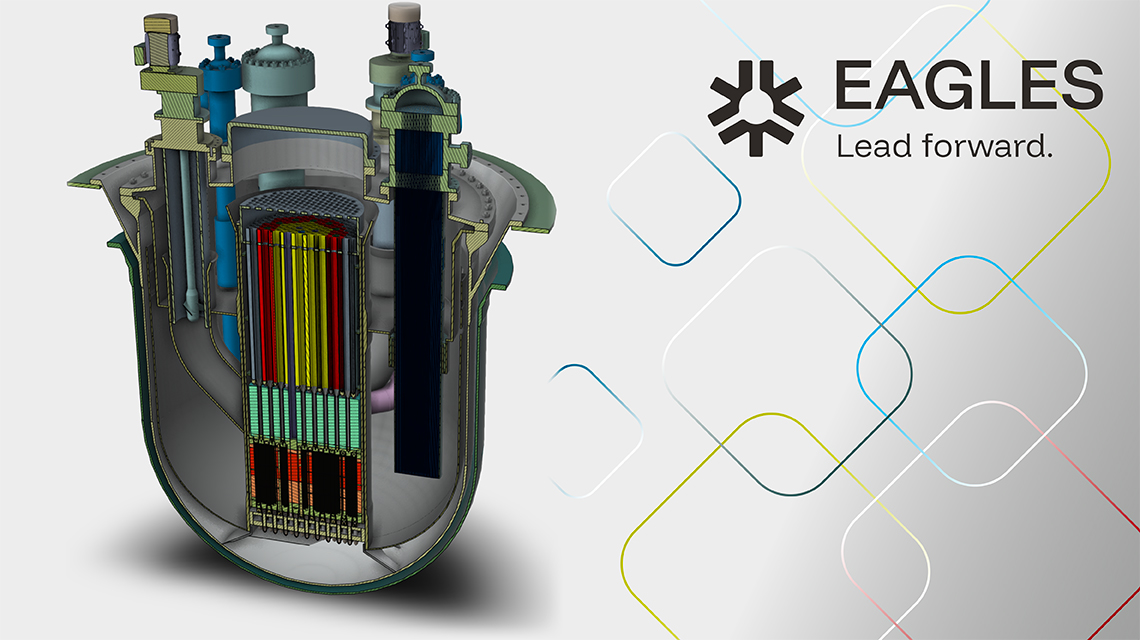Italian National Agency for New Technologies, Energy and Sustainable Economic Development

Nuclear: ENEA joins the EAGLES alliance for fourth-generation reactors
Agreement signed with IAEA for development by 2039
International project launched to accelerate the development of a fourth-generation lead-cooled reactor in Europe. The EAGLES Consortium, composed by ENEA and Ansaldo Nucleare for Italy, RATEN for Romania and SCK CEN for Belgium, has signed an agreement with the International Atomic Energy Agency (IAEA) to streamline and harmonize authorization processes at international level with a view to building the innovative EAGLES-300 reactor by 2039.
This will be a 350 MWe small modular reactor (SMR) designed to reduce construction time and contain investment costs. Thanks to passive safety systems that operate without human intervention or electrical power, and lead cooling that provides robustness and design simplification, EAGLES-300 will have high safety standards. A further distinctive feature will be the fuel management: the reactor will use MOX (Mixed Oxide Fuel), a mixture of oxides that will also include recycled materials and spent fuel from previous-generation power plants, with the aim of reducing radioactive waste and using resources more efficiently, increasing sustainability compared to traditional
International project launched to accelerate the development of a fourth-generation lead-cooled reactor in Europe. The EAGLES Consortium, composed by ENEA and Ansaldo Nucleare for Italy, RATEN for Romania and SCK CEN for Belgium, has signed an agreement with the International Atomic Energy Agency (IAEA) to streamline and harmonize authorization processes at international level with a view to building the innovative EAGLES-300 reactor by 2039.
This will be a 350 MWe small modular reactor (SMR) designed to reduce construction time and contain investment costs. Thanks to passive safety systems that operate without human intervention or electrical power, and lead cooling that provides robustness and design simplification, EAGLES-300 will have high safety standards. A further distinctive feature will be the fuel management: the reactor will use MOX (Mixed Oxide Fuel), a mixture of oxides that will also include recycled materials and spent fuel from previous-generation power plants, with the aim of reducing radioactive waste and using resources more efficiently, increasing sustainability compared to traditional reactors. Thanks to its characteristics and high versatility, EAGLES-300 can also be used not only in the electricity sector, but also in alternative fields such as industrial heat production and hydrogen generation.
The signing of the agreement, which took place in the course of the 69th IAEA General Conference, marks the first time that national regulatory authorities will collaborate from the earliest stages of advanced reactor development. The goal is to align safety standards and regulatory expectations, shorten authorization timelines, and accelerate safe deployment worldwide. The project, involving the nuclear regulatory authorities of Belgium (FANC) and Romania (CNCAN), with Italy’s ISIN as an observer, is the first pilot project launched within the IAEA's Nuclear Harmonization and Standardization Initiative (NHSI) - a significant step towards the global harmonization of nuclear safety regulations.
This pre-licensing phase allows regulators and technology developers to engage in early dialogue prior to the formal license application. It promotes mutual understanding of safety standards, technical challenges, and regulatory frameworks, enabling the early identification of any critical issues and the preparation of more streamlined, informed licensing processes.
To qualify and validate the innovative technological and engineering solutions that will be developed within the Consortium, two demonstration prototypes will be constructed: the first, LEANDREA, to be built in Mol, Belgium, for testing of advanced fuels and materials; the second, ALFRED, to be built in Pitesti, Romania, to qualify the entire design for its subsequent commercialization.
reactors. Thanks to its characteristics and high versatility, EAGLES-300 can also be used not only in the electricity sector, but also in alternative fields such as industrial heat production and hydrogen generation.
The signing of the agreement, which took place in the course of the 69th IAEA General Conference, marks the first time that national regulatory authorities will collaborate from the earliest stages of advanced reactor development. The goal is to align safety standards and regulatory expectations, shorten authorization timelines, and accelerate safe deployment worldwide. The project, involving the nuclear regulatory authorities of Belgium (FANC) and Romania (CNCAN), with Italy’s ISIN as an observer, is the first pilot project launched within the IAEA's Nuclear Harmonization and Standardization Initiative (NHSI) - a significant step towards the global harmonization of nuclear safety regulations.
This pre-licensing phase allows regulators and technology developers to engage in early dialogue prior to the formal license application. It promotes mutual understanding of safety standards, technical challenges, and regulatory frameworks, enabling the early identification of any critical issues and the preparation of more streamlined, informed licensing processes.
To qualify and validate the innovative technological and engineering solutions that will be developed within the Consortium, two demonstration prototypes will be constructed: the first, LEANDREA, to be built in Mol, Belgium, for testing of advanced fuels and materials; the second, ALFRED, to be built in Pitesti, Romania, to qualify the entire design for its subsequent commercialization.


